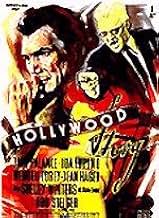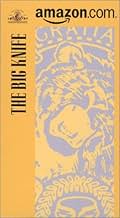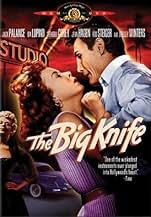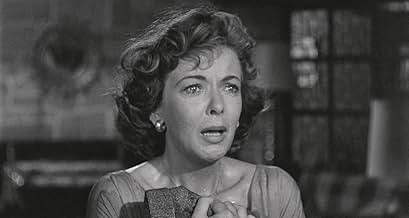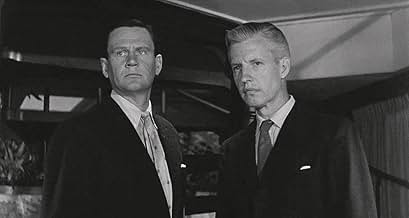AVALIAÇÃO DA IMDb
6,8/10
4,7 mil
SUA AVALIAÇÃO
Adicionar um enredo no seu idiomaHollywood actor Charles Castle is pressured by his studio boss into a criminal cover-up to protect his valuable career.Hollywood actor Charles Castle is pressured by his studio boss into a criminal cover-up to protect his valuable career.Hollywood actor Charles Castle is pressured by his studio boss into a criminal cover-up to protect his valuable career.
- Prêmios
- 1 vitória e 2 indicações no total
Michael Winkelman
- Billy Castle
- (as Mike Winkelman)
Shelley Winters
- Dixie Evans
- (as Miss Shelley Winters)
Richard Boone
- Narrator
- (narração)
- (não creditado)
Nick Cravat
- Nick
- (não creditado)
Robert Emhardt
- Bit Part
- (não creditado)
Michael Fox
- Prize Fight Announcer
- (não creditado)
Paula Kyle
- Party Guest
- (não creditado)
- Direção
- Roteiristas
- Elenco e equipe completos
- Produção, bilheteria e muito mais no IMDbPro
Avaliações em destaque
"The Big Knife" caused a sensation when it came out. After all, no one in his right mind would dare to criticize the movie industry, after all, it was the studio and its ruthless executives that were exposed as the bad guys, even at the time where the old studio system was disappearing.
Clifford Odets wrote the original play, which under Robert Aldrich direction doesn't translate to the screen because it feels claustrophobic in many aspects. The movie treatment was by James Poe, did not make the material come alive because of the theatricality of the source.
Charles Castle, an actor working in Hollywood, is about to commit himself to a renewal of his contract to a major studio. That means another seven years of his life working in whatever pictures the higher ups have in store for him. It couldn't come at a worse time; his wife, Marion, who evidently hasn't a good relation with Charles, is fed up with the idea of staying in Bel Air. Marion pleads with him to give up the movie business so they could have a normal life bringing up their young son.
Castle has had his share of adventures in Hollywood, something that Marion is aware of. In addition to that, he has a dark secret, something that involved a terrible accident for which his publicist has taken the blame and has even serve time in jail. A couple of women are also in the picture, threatening Charles' marriage.
To make matters worse, Charles is visited by the head of the studio, Stanley Hoff, who has brought his assistant, the oily Smiley Coy, to help him convince Castle to sign the contract. Charles Castle is finally defeated at the game as Stanley plays his cards right since he has the upper hand. The result is a bitter loss for the actor, who sees no way out of the situation at hand.
Jack Palance, who, up to this film, had only minor parts, rose to the challenge of playing Charles Castle, who in a way, he had the background, having been a boxer, to play. His work, although a bit unsure, was a revelation to the movie going public at the time. Ida Lupino, an excellent actress, is probably the best thing in the picture. Rod Steiger shows up as the studio head Stanley Hoff, a man that knows well his opponent's weaknesses and uses all in his power to get his way. Wendell Corey, in a small part, also does good work. Jean Hagen and Shelley Winters also contribute to the film.
Ernest Lazlo's cinematography works well, as does the musical score by Frank DeVol. Robert Aldrich, a man with a lot of experience in the business, was a natural choice to undertake the direction of this picture. His only problem was a basic one, how to open the play to cinematic terms.
Clifford Odets wrote the original play, which under Robert Aldrich direction doesn't translate to the screen because it feels claustrophobic in many aspects. The movie treatment was by James Poe, did not make the material come alive because of the theatricality of the source.
Charles Castle, an actor working in Hollywood, is about to commit himself to a renewal of his contract to a major studio. That means another seven years of his life working in whatever pictures the higher ups have in store for him. It couldn't come at a worse time; his wife, Marion, who evidently hasn't a good relation with Charles, is fed up with the idea of staying in Bel Air. Marion pleads with him to give up the movie business so they could have a normal life bringing up their young son.
Castle has had his share of adventures in Hollywood, something that Marion is aware of. In addition to that, he has a dark secret, something that involved a terrible accident for which his publicist has taken the blame and has even serve time in jail. A couple of women are also in the picture, threatening Charles' marriage.
To make matters worse, Charles is visited by the head of the studio, Stanley Hoff, who has brought his assistant, the oily Smiley Coy, to help him convince Castle to sign the contract. Charles Castle is finally defeated at the game as Stanley plays his cards right since he has the upper hand. The result is a bitter loss for the actor, who sees no way out of the situation at hand.
Jack Palance, who, up to this film, had only minor parts, rose to the challenge of playing Charles Castle, who in a way, he had the background, having been a boxer, to play. His work, although a bit unsure, was a revelation to the movie going public at the time. Ida Lupino, an excellent actress, is probably the best thing in the picture. Rod Steiger shows up as the studio head Stanley Hoff, a man that knows well his opponent's weaknesses and uses all in his power to get his way. Wendell Corey, in a small part, also does good work. Jean Hagen and Shelley Winters also contribute to the film.
Ernest Lazlo's cinematography works well, as does the musical score by Frank DeVol. Robert Aldrich, a man with a lot of experience in the business, was a natural choice to undertake the direction of this picture. His only problem was a basic one, how to open the play to cinematic terms.
A truly memorable film with tough and rugged, but hardly handsome, Jack Palance as Charlie Castle playing of all people an actor who's always playing matinée Idols and great lovers. As Charlie's boss and studio owner Stanley Hoff,Rod Steiger, says of him throughout the film :"He makes all the women of America heart's swoon". "The Big Knife" is worth the price of admission just to see how and if director Robert Aldrich can pull it off and make the film both entertaining and believable.
You see Charlie is getting tired of playing all those roles over the years as a heart throb to the women of America and wants to get out of his contract with the Hoff Studios and go independent; That was a big thing for actors back in the 1950's. Charlie wan't to do films that are worthy of his extraordinary talents as a serious and Shakespearian actor. It's that Charlie's off the wall and possessive boss Stanley Hoff, the Big Knife, doesn't want his meal ticket to leave and take his fans with him! So Stanley rolls out the heavy artillery and plays his trump card. It seems that Charlie has a dark secret that the studio has been covering up for years and if Charlie leaves that secret won't be a secret any more! Get It Charlie!
The film "The Big Knife" can really be described as one of the most multi storied soap operas ever put on film with the audience needing score cards just to keep up with the story and even then they'll get lost. Whoever coined the phrase "Seeing is believing" must have based it on the the incredible performance of Rod Steiger's Stanley Hoff which goes from a Saturday Night Live impersonation shtick of a big Hollywood producer to an Oscar winning interpretation of Hamlet all at the same time! It's really incredible to watch and believe what your seeing in Steiger's over the top performance.
And Jack Palance, determined not to be shown up his co-star, really did pull it off in him Playing a role so out of character and yet evoking real and genuine sympathy from the audience that he should have, but didn't, won the 1955 Academy Award for best actor hands down! As the tortured soul with a dark past who only wanted to do Art Films and get away from playing debonair and charming movie parts that make women go ape all over him. In the end of the film when Palance went all out, or was it underwater, in the final few minutes of the movie he was so convincing that I just couldn't keep the tears from rolling down my cheeks!
No matter how much people criticize Robert Aldrich's "The Big Knife" and with good justification this is one movie where you can really say that the acting actually overwhelmed the script!
You see Charlie is getting tired of playing all those roles over the years as a heart throb to the women of America and wants to get out of his contract with the Hoff Studios and go independent; That was a big thing for actors back in the 1950's. Charlie wan't to do films that are worthy of his extraordinary talents as a serious and Shakespearian actor. It's that Charlie's off the wall and possessive boss Stanley Hoff, the Big Knife, doesn't want his meal ticket to leave and take his fans with him! So Stanley rolls out the heavy artillery and plays his trump card. It seems that Charlie has a dark secret that the studio has been covering up for years and if Charlie leaves that secret won't be a secret any more! Get It Charlie!
The film "The Big Knife" can really be described as one of the most multi storied soap operas ever put on film with the audience needing score cards just to keep up with the story and even then they'll get lost. Whoever coined the phrase "Seeing is believing" must have based it on the the incredible performance of Rod Steiger's Stanley Hoff which goes from a Saturday Night Live impersonation shtick of a big Hollywood producer to an Oscar winning interpretation of Hamlet all at the same time! It's really incredible to watch and believe what your seeing in Steiger's over the top performance.
And Jack Palance, determined not to be shown up his co-star, really did pull it off in him Playing a role so out of character and yet evoking real and genuine sympathy from the audience that he should have, but didn't, won the 1955 Academy Award for best actor hands down! As the tortured soul with a dark past who only wanted to do Art Films and get away from playing debonair and charming movie parts that make women go ape all over him. In the end of the film when Palance went all out, or was it underwater, in the final few minutes of the movie he was so convincing that I just couldn't keep the tears from rolling down my cheeks!
No matter how much people criticize Robert Aldrich's "The Big Knife" and with good justification this is one movie where you can really say that the acting actually overwhelmed the script!
The Big Knife is a mostly good adaptation of a Clifford Odets play about a Hollywood actor who's being blackmailed into studio servitude while trying to patch up his failing marriage. This is a movie for which the word powerful was truly invented. Most of the film takes place on one set and places heavy emphasis on speeches from the individual characters for its really riveting moments (as I would expect from a stage play), but those moments definitely get across. The whole cast is good, but Jack Palance in a nuanced and fiery performance as the actor Charlie Castle, and Rod Steiger, giving a deeply felt and passionate realization of the corrupt studio boss are nothing short of superb. The screenplay is full of smart, incisive, biting dialogue as well. Except for a melodramatic turn at the end, that, for me, takes a lot of the edge off the story, this is a well-acted film that is solid, though not spectacular, entertainment. 3*** out of 4
Too talky for some, too stage-bound for others, too strident for all, this is not a movie for everyone. Yet The Big Knife continues to fascinate at the same time it annoys. Maybe it's the savage depiction of Hollywood politics and the amoral glamour industry surrounding it. After all, neither blackmail nor murder is off-limits to ego-maniacal studio boss Stanley Hoff ( vintage Rod Steiger), while the human sharks swimming around him behave nothing like opening night at the Oscars. Maybe it's the sterling cast, featuring such 50's exotica as Steiger, Jack Palance, Wendell Corey, and Shelley Winters. In the end, of course, everyone gets to explode on screen except the ice cold Corey whose chronic bemusement proves ultimately more satanic than cynical. Whatever the reason, the result is an over-the-top cavalcade of unusual flair.
It's likely that producer-director Robert Aldrich targeted the film in behalf of blacklisted mentor Abraham Polonsky with whom he had collaborated on 1948's Force of Evil. After all, the year was 1955 and the all-powerful list could not be attacked directly, so what better vehicle than Clifford Odet's corrosive stage play adapted for all America to see. (Odets would do the same for Broadway in 1957's revealing Sweet Smell of Success.) It's fun to imagine how Aldrich's resulting indictment played in studio screening rooms where real reputations were at stake. Then too, much of the film's dirty laundry appears based on fact. The hit and run on Clark Gable's hushed-up 1933 episode; the Palance character on John Garfield's death at 39, listed officially as heart attack. It's hard to picture the producers ever believing such curdled fare would actually make money. Of course it didn't, angering many ticket-buyers with a title that seemed to imply real action instead of endless palaver. Still, this overheated exercise in shameless baroque remains an interesting oddity. A permanent record not only of individual styles, but of artistic protest amidst the throes of cultural repression.
It's likely that producer-director Robert Aldrich targeted the film in behalf of blacklisted mentor Abraham Polonsky with whom he had collaborated on 1948's Force of Evil. After all, the year was 1955 and the all-powerful list could not be attacked directly, so what better vehicle than Clifford Odet's corrosive stage play adapted for all America to see. (Odets would do the same for Broadway in 1957's revealing Sweet Smell of Success.) It's fun to imagine how Aldrich's resulting indictment played in studio screening rooms where real reputations were at stake. Then too, much of the film's dirty laundry appears based on fact. The hit and run on Clark Gable's hushed-up 1933 episode; the Palance character on John Garfield's death at 39, listed officially as heart attack. It's hard to picture the producers ever believing such curdled fare would actually make money. Of course it didn't, angering many ticket-buyers with a title that seemed to imply real action instead of endless palaver. Still, this overheated exercise in shameless baroque remains an interesting oddity. A permanent record not only of individual styles, but of artistic protest amidst the throes of cultural repression.
"The Big Knife" is really a stage play recorded on film. It's a Hollywood soap opera that features a lot of good actors eating the scenery. Rod Steiger and Everett Sloan are great as the monstrous studio honcho and weaselly agent, respectively. Jack Palance is a competent actor but was woefully miscast as the sensitive, tortured matinée idol -- nobody would ever confuse Palance with a matinée idol. Nevertheless, he does an adequate job.
The power of the studio system in the '50s is well depicted, if a bit overwrought. Steiger's performance is particularly delicious as his toweringly self-centered character cries, wheedles, and intimidates his underlings into doing what he wants.
The movie is showing its age but its excesses, especially its colorful language, are a lot of fun. Recommended, 7 out of 10.
The power of the studio system in the '50s is well depicted, if a bit overwrought. Steiger's performance is particularly delicious as his toweringly self-centered character cries, wheedles, and intimidates his underlings into doing what he wants.
The movie is showing its age but its excesses, especially its colorful language, are a lot of fun. Recommended, 7 out of 10.
Você sabia?
- CuriosidadesBecause of its vitriolic take on Tinseltown, this was unsurprisingly turned down by all the major studios in Hollywood. It eventually found a home at United Artists.
- Erros de gravaçãoThe camera and operator are visibly reflected in one scene in the living room.
- Citações
Smiley Coy: A woman with six martinis can ruin a city.
- Cenas durante ou pós-créditosIn the opening credits: Upholstered furniture by Martin/ Brattrud.
- ConexõesFeatured in Les dossiers de l'écran: Les coulisses du cinéma (1970)
Principais escolhas
Faça login para avaliar e ver a lista de recomendações personalizadas
- How long is The Big Knife?Fornecido pela Alexa
Detalhes
- Data de lançamento
- País de origem
- Idioma
- Também conhecido como
- The Big Knife
- Locações de filme
- Empresa de produção
- Consulte mais créditos da empresa na IMDbPro
Bilheteria
- Orçamento
- US$ 423.000 (estimativa)
- Tempo de duração
- 1 h 51 min(111 min)
- Cor
- Proporção
- 1.85 : 1
Contribua para esta página
Sugerir uma alteração ou adicionar conteúdo ausente


